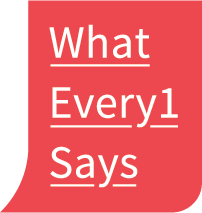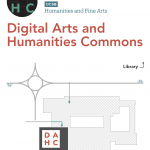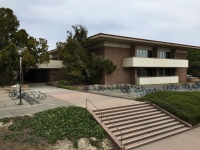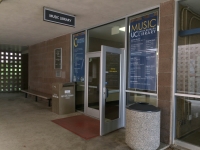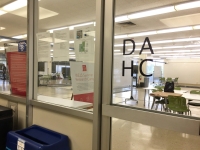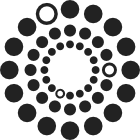Directory of WE1S Developer Sites & Tools
WE1S developers work together using a combination of the following sites and tools.
WE1S Developer Sites
- Summer Research Camp 2019 site
- Summer Research Camp 2018 site
- WE1S Google shared drive
- PBWorks Developers Site
- Collection and Analysis Tools
- Harbor 5000: WE1S Workflow Management System (WMS) -- creates, stores, and manages WE1S "manifests"
- Harbor 9999: Jupyter notebooks workspace --processes and topic models collections
- Harbor 10000: Jupyter notebooks workspace --processes and topic models collections
- Mirrormask 9999: Jupyter notebooks workspace -- processes and topic models collections
- Google form for Collection queuing
- Nexis Uni Source IDs + Geography
- Interpretation Tools
- WE1S Topic Model Observatory
- Tools and interfaces [pending]
- Topic Model Observatory Guide
- WE1S Topic Model Interpretation Protocol
- Qualtrics Survey modules (live surveys)
- Word document versions of Qualtrics modules (for reference)
- PDFs of Qualtrics modules (for reference)
- WE1S Topic Model Observatory
- WE1S Github Repository
WE1S Bibliography
- Zotero group library | WE1S WordPress site view of the Zotero group library
- WE1S form for submitting to the Zotero group library (Note: anyone can access the form and fill it out; share permission is only required to edit the questions in the form itelf)
- Google sheet showing citations collected from the form and queued for the WE1S bibliography editor to enter into Zotero
WE1S Communication Tools
- WE1S Ryver
- Zoom for remote meetings (instructions for joining)
- The default Zoom address for UCSB-CSUN plenary meetings started by Alan Liu is Alan's “instant” meeting URL: https://ucsb.zoom.us/j/7600211662
Summer Research Camp Locations and Dates
WE1S summer research camps take place simultaneously at U. California, Santa Barbara (UCSB) and California State U., Northridge (CSUN) during July 2 through August 4, 2018–usually for four days a week (five hours per day). See below for detailed schedule of activities.
At UCSB, the location will be the Digital Arts & Humanities Commons (DAHC), located in the Music Building. (See maps.) At CSUN, the location will be [TBD]. Occasionally, the CSUN group will travel up to Santa Barbara to join the UCSB group. The default Zoom meeting URL is: https://ucsb.zoom.us/j/7600211662
Maps (scroll to see all if viewing on small screen)
Location on Google Maps
Participants
Participants in the WE1S project’s two summer research camps at UCSB and CSUN will work in parallel on their separate campuses. But they will also rendezvous face-to-face at UCSB during the initial and final weeks of the camp; and they will also often be in contact throughout the period by means of remote conferencing.
UCSB Summer Research Group
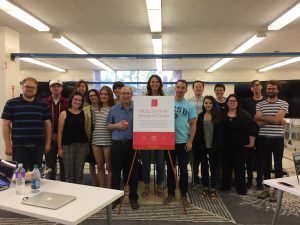
Faculty
- Alan Liu (UCSB English, WE1S PI)
- Jeremy Douglass (UCSB English, WE1S co-PI)
- Lindsay Thomas (U. Miami English, WE1S co-PI, in residence at UCSB for the summer)
Postdoctoral Scholars
The WE1S project will be joined by two postdoctoral scholars beginning July 1, 2018. Each of these scholars work in areas and methods that complement the project.
- Dan Costa Baciu (Ph.D., 2018, Architectural History, Illinois Institute of Technology; HathiTrust Research Center Advanced Collaborative Support awardee) — ORCID page | HathiTrust Research Center project report | SAATCHI Art profile
- Abigail Droge (Ph.D., 2018, English, Stanford University; Stanford Literary Lab member)
Research Assistants
- Sandra Auderset (Linguistics)
- Rebecca Baker (English)
- Alanna Bartolini (English)
- Sean Gilleran (History)
- Jennifer Hessler (Film and Media Studies)
- Selin Karabulut (Political Science)
- Nazanin Keynejad (Comparative Literature)
- Ryan Leach (English)
- Kajsa Philippa Niehusen (Film and Media Studies)
- Sihwa Park (Media Arts & Technology)
- Giorgina Paiella (English, WE1S Project Manager at UCSB)
- Aili Pettersson Peeker (English)
- Jamal Russell (English)
- Tyler Shoemaker (English)
CSUN Summer Research Group
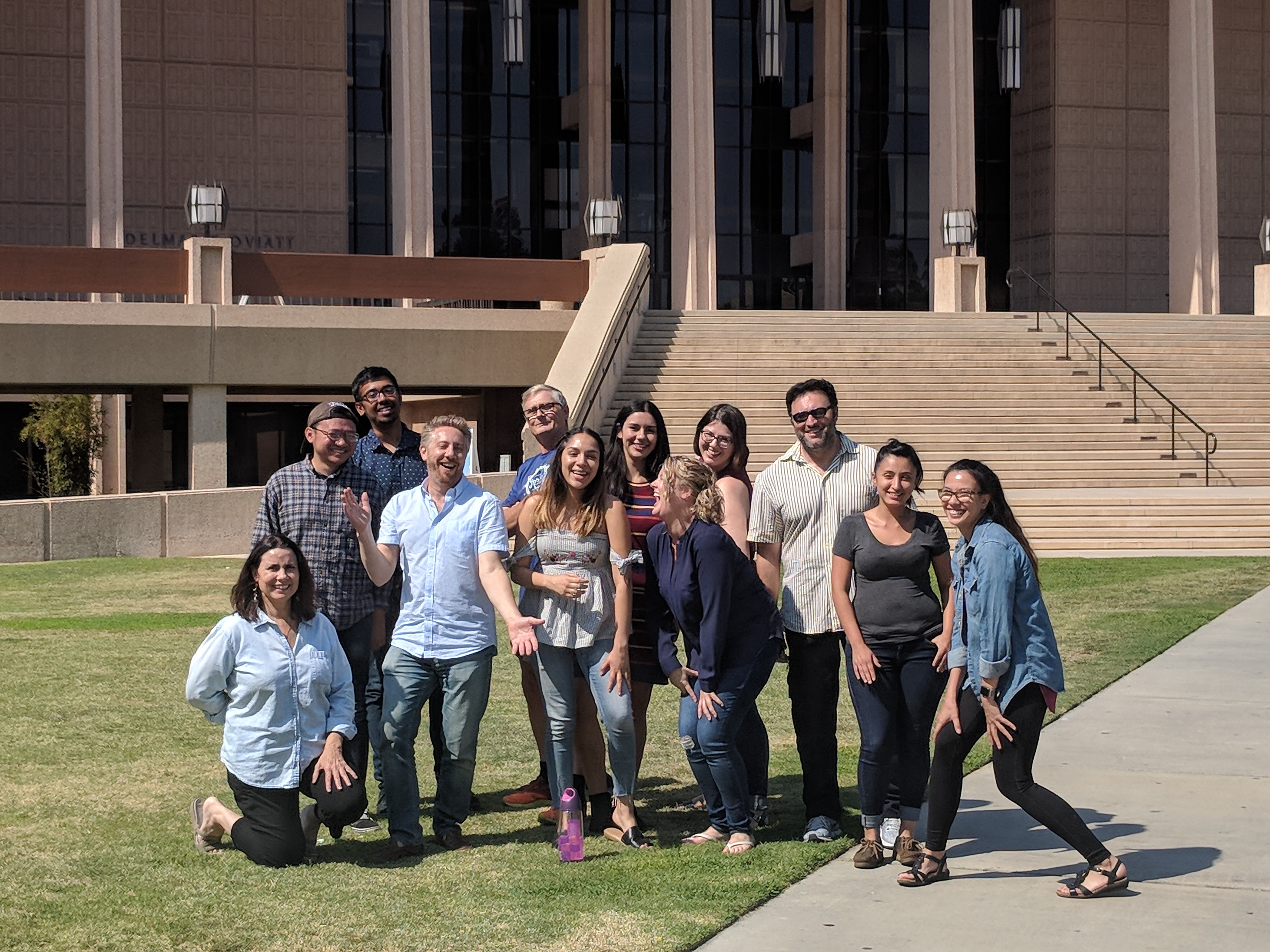
Faculty
- Scott Kleinman (English, WE1S co-PI)
- Mauro Carassai (Liberal Studies)
- Colleen Tripp (English)
Research Assistants
- Mahbubah Anando (Computer Science)
- Joyce Brummet (English)
- Vanessa López (English)
- Maureen Nyhan (Humanities)
- Phu Nguyen (Computer Science)
- Kenia Rodriguez (English)
- Raymond Steding (English)
- Samantha Wallace (English)
- Katie Wolf (English)
Research Teams
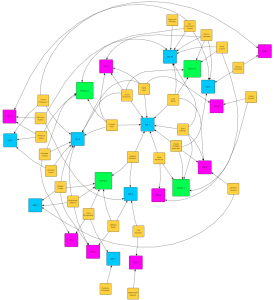
Participants in the summer research camps will be organized into teams directed toward various goals. Each research assistant will be part of two teams–a morning session team focused on collecting and analyzing public discourse on the humanities in particular areas (e.g., from media in particular regions of the world or media addressed to diverse populations), and an afternoon session team focused on other kinds of tasks (e.g., prototyping WE1S’s eventual outputs, researching issues and contexts, or experimenting with alternatives to or extensions of the project’s main digital humanities methodologies). Project PIs, faculty, and postdoctoral scholars will facilitate the work of the teams and sometimes also be embedded in particular teams. At the end of the research camp, teams will give presentations to the visiting members of the WE1S Advisory Board, who will be on campus August 3-4 for a Board meeting (see below).
AM Teams (Morning Session Teams)
- Collection/analysis teams responsible for analyzing topic models and materials collected for a particular area of the world, population group, or media type.
WE1S Workflow System Links
- Mirrormask 9998: Workflow Manager (Manifests and database)
- Mirrormask 9999: Workspace Manager System (WMS) -- Jupyter Notebooks
Shared Google Drive
Google form for Collection queuing (created July 17th as temporary tool)- (1) U.S. and Canada team (national, regional, and local newspapers) [Starter Kit] [Lab Notebook]
- UCSB: Dan Baciu, Alanna Bartolini, Sean Gilleran, Selin Karabulut, Kajsa Niehusen
- CSUN: Joyce Brummet, Colleen Tripp, Katie Wolf
- (2) United Kingdom team [Starter Kit] [Lab Notebook]
- UCSB: Abigail Droge, Jennifer Hessler
- CSUN: Scott Kleinman, Samantha Wallace
- (3) Asia team (South Asia and Far East) [Starter Kit] [Lab Notebook]
- UCSB: Alanna Bartolini, Sihwa Park
- CSUN: Phu Nguyen, Maureen Nyhan
- [(4) Australia & New Zealand team] (to be formed in future)
- (5) Mexico, Central, & South America team
 [Starter Kit] [Lab Notebook]
[Starter Kit] [Lab Notebook]
- UCSB: Rebecca Baker
- CSUN: Vanessa Lopez, Kenia Rodriguez
- (6) Europe team (Western & Eastern Europe) [Starter Kit] [Lab Notebook]
- UCSB: Sandra Auderset, Kajsa Niehusen, Aili Peeker
- CSUN: Mauro Carassai
- (7) Middle East & Africa team
 [Starter Kit] [Lab Notebook]
[Starter Kit] [Lab Notebook]
- UCSB: Nazanin Keynejad, Tyler Shoemaker
- (8) Diverse populations team (starting with U.S.) [Starter Kit] [Lab Notebook]
- UCSB: Abigail Droge, Giorgina Paiella, Lindsay Thomas
- CSUN: Joyce Brummet, Vanessa Lopez, Kenia Rodriguez, Colleen Tripp, Samanta Wallace, Katie Wolf
- (10) Broadcast, Internet, & Political media team [Starter Kit] [Lab Notebook]
- UCSB: Dan Baciu, Sean Gilleran, Ryan Leach, Aili Peeker
- CSUN: Mauro Carassai, Maureen Nyhan, Raymond Steding
PM Teams (Afternoon Session Teams)
- Different from the morning teams, afternoon teams are focused on a variety of research tasks that may include planning and prototyping, investigation of issues and contexts, and creating reports or resources. (Team members are tiered below by order of their preference rankings for teams as indicated on this poll. Members who originally signed up for a team but did not include it in their poll rankings, or who did not complete the poll, are currently included in tier 4 of a team.)
- (1) Global Humanities team(s) focused on researching and writing reports on the nature, role, perception, and context of the humanities and arts in different regions of the world and in different population groups.
 Mission Statement: “Our team goal is to investigate what “the humanities” means on a worldwide scale–more specifically, what it entails outside of a US–and Western–paradigm. We will draw on current research being done on the question of the Global Humanities, as well as investigate the mission statements of various universities and humanities advocacy groups….” [Lab Notebook]
Mission Statement: “Our team goal is to investigate what “the humanities” means on a worldwide scale–more specifically, what it entails outside of a US–and Western–paradigm. We will draw on current research being done on the question of the Global Humanities, as well as investigate the mission statements of various universities and humanities advocacy groups….” [Lab Notebook]
- UCSB:
- Rebecca Baker, Aili Peeker
- (plus representatives of the AM teams on occasion)
- CSUN:
- Maureen Nyhan
- UCSB:
- (2) Historical Humanities team(s) focused on investigating, for example, the humanities in 1800, 1900, 1960, 1980, 1990, 2000, and now.
 Mission Statement: “Our team is focused on investigating how the public discourse around the humanities has changed throughout history. Looking at specific time periods, we want to understand how the humanities have been contextualized and regulated historically, and what kinds of cultural explanations we can provide for the trends we see….” [Lab Notebook]
Mission Statement: “Our team is focused on investigating how the public discourse around the humanities has changed throughout history. Looking at specific time periods, we want to understand how the humanities have been contextualized and regulated historically, and what kinds of cultural explanations we can provide for the trends we see….” [Lab Notebook]
- UCSB:
- Sean Gilleran, Jennifer Hessler (Tue & Thur), Dan Baciu, Kajsa Niehusen, Jennifer Hessler
- UCSB:
- (3) Imagining Outputs team(s) focused on designing the nature, content, and presentation of the WE1S project’s eventual deliverables to a variety of audiences, including segments of the public (e.g., politicians, journalists, parents, students), scholars, and digital humanists. Outputs to be sketched out or prototyped might also include the project’s eventual public site interface and interactive visualizations.
 Mission Statement: “We want to create outputs that follow these key values: 1) Accessibility 2) Inclusivity 3) Re-purposability/Transferability. Our goal is to promote the humanities to diverse audiences in a way that also prompts self-reflection about our own practice as scholars and teachers….” [Lab notebook]
Mission Statement: “We want to create outputs that follow these key values: 1) Accessibility 2) Inclusivity 3) Re-purposability/Transferability. Our goal is to promote the humanities to diverse audiences in a way that also prompts self-reflection about our own practice as scholars and teachers….” [Lab notebook]
- UCSB:
- Abigail Droge, Sihwa Park
- CSUN:
- Samantha Wallace
- UCSB:
- (4) Experimenting with Methods team(s) focused on investigating ways to augment the WE1S project’s core methods, e.g., through alternate implementations of topic modeling, word embedding, other kinds of text analysis or corpus linguistics, clustering and sampling methods, and visualization.
 Mission Statement: “Starting with the existing WMS and tools, we propose extensions in terms of both preprocessing as well as post-processing the data. Given that topic modelling is an unsupervised algorithm designed for exploratory work, we’d like to also investigate and propose supervised algorithms that fulfill additional tasks. The goal for each proposed algorithm is identifying its what, where, how, and why; i.e. at which place in the workflow management the algorithm is to be implemented, using what data structures, and for which purpose…. By explicating the methods that create an unfolding new ‘Digital Humanities’ discipline which incorporates the humanities we fulfill the mission of this project….” [Lab Notebook)]
Mission Statement: “Starting with the existing WMS and tools, we propose extensions in terms of both preprocessing as well as post-processing the data. Given that topic modelling is an unsupervised algorithm designed for exploratory work, we’d like to also investigate and propose supervised algorithms that fulfill additional tasks. The goal for each proposed algorithm is identifying its what, where, how, and why; i.e. at which place in the workflow management the algorithm is to be implemented, using what data structures, and for which purpose…. By explicating the methods that create an unfolding new ‘Digital Humanities’ discipline which incorporates the humanities we fulfill the mission of this project….” [Lab Notebook)]
- UCSB:
- Selin Karabulut, Ryan Leach
- UCSB:
- (5) Scholarly Deliverables Planning team focused on designing an ongoing or future publication, lecturing, and other research dissemination strategy that can enhance the careers especially of graduate-student, postdoctoral, and junior-faculty participants. For example, what articles based on the project’s research might interested participants author or co-author, and for what journals? What scholarly blog posts might participants write for the WE1S site or for their own blog to increase early-career professional visibility? What conferences could participants submit papers to? How can participants draw on the research themes or methods of WE1S to complement their own individual research for dissertations or articles?
 Mission Statement: “We take WE1S to be a seed project that will generate, interface, and complement ongoing research undertaken by team members and a larger scholarly community. Our goal is to encourage these projects and to scaffold them into the WE1S project’s larger research output, both by providing a portal for potential interlocutors and by providing a venue for advertising work….” [Lab Notebook]
Mission Statement: “We take WE1S to be a seed project that will generate, interface, and complement ongoing research undertaken by team members and a larger scholarly community. Our goal is to encourage these projects and to scaffold them into the WE1S project’s larger research output, both by providing a portal for potential interlocutors and by providing a venue for advertising work….” [Lab Notebook]
- UCSB:
- Giorgina Paiella, Tyler Shoemaker, Lindsay Thomas
- UCSB:
- (6) Philosophy of Methods team focused on making apparent the assumptions of the project’s goals and methods (e.g., by producing a flow chart of alternative branches of assumptions and methods).
 Mission Statement: “The purpose of this group is to examine the epistemological assumptions that underlie the WE1S project. We will consider the possibilities and complications of topic modeling procedures within the digital humanities. Our goal is to construct topic model experiments and case studies in which we test the limits and potential extended applications of topic modeling outside of the set of assumptions on which this procedure is based.” [Lab Notebook]
Mission Statement: “The purpose of this group is to examine the epistemological assumptions that underlie the WE1S project. We will consider the possibilities and complications of topic modeling procedures within the digital humanities. Our goal is to construct topic model experiments and case studies in which we test the limits and potential extended applications of topic modeling outside of the set of assumptions on which this procedure is based.” [Lab Notebook]
- CSUN:
- Mauro Carassai, Colleen Tripp, Joyce Brummet, Katie Wolf
- CSUN:
- (7) Cross-Disciplinary Methods team focused on thinking about how the project can borrow from the methods of other disciplines, reciprocally, and how other disciplines could benefit from the project’s methods.
 Mission Statement: “Evaluate the ways that certain disciplines (Linguistics, Literature, History, Political Science, Sociology, Human Geography, Applied Statistics, Computer Science, Neuroscience, and Cultural Anthropology) use the research methods WE1S is utilizing, such as topic modeling, word embedding/vectors, and text-classification. Our study will answer how the project can borrow from the methods of other disciplines, reciprocally, and how other disciplines could benefit from the project’s methods. In addition, we will investigate how the project can benefit from the approach these disciplines might take with respect to the overarching research question: How would other disciplines go about answering this question? What methods would they use? How would they analyze their results? etc.” [Lab Notebook]
Mission Statement: “Evaluate the ways that certain disciplines (Linguistics, Literature, History, Political Science, Sociology, Human Geography, Applied Statistics, Computer Science, Neuroscience, and Cultural Anthropology) use the research methods WE1S is utilizing, such as topic modeling, word embedding/vectors, and text-classification. Our study will answer how the project can borrow from the methods of other disciplines, reciprocally, and how other disciplines could benefit from the project’s methods. In addition, we will investigate how the project can benefit from the approach these disciplines might take with respect to the overarching research question: How would other disciplines go about answering this question? What methods would they use? How would they analyze their results? etc.” [Lab Notebook]
- UCSB:
- Sandra Auderset
- CSUN
- Kenia Rodriguez
- UCSB:
- (8) “Publicness”and “Newsworthiness”team focused on researching the notions of the “public” and the “newsworthy” (and how these notions influence each other) in various locations and times.
 Mission Statement: “The primary objective of this team is to develop a definition of ‘publicness’ and ‘newsworthiness’ that will aid in the project’s investigation of how discourses about the humanities are shaped. This group treats ‘publicness’ and ‘newsworthiness’ as related terms because the “newsworthiness” of a story is often shaped by which “public” that story is written for” [Lab Notebook]
Mission Statement: “The primary objective of this team is to develop a definition of ‘publicness’ and ‘newsworthiness’ that will aid in the project’s investigation of how discourses about the humanities are shaped. This group treats ‘publicness’ and ‘newsworthiness’ as related terms because the “newsworthiness” of a story is often shaped by which “public” that story is written for” [Lab Notebook]
- UCSB:
- Jamal Russell
- CSUN:
- Katie Wolf
- UCSB:
- (9) Tools Development Team
- CSUN:
- Scott Kleinman, Phu Nguyen, Mahbubah Anando
- CSUN:
- (1) Global Humanities team(s) focused on researching and writing reports on the nature, role, perception, and context of the humanities and arts in different regions of the world and in different population groups.
Advance Orientation Materials
Research assistants and others participating in the 2018 WE1S summer research camp are asked to read the following materials in advance of the start of the camp. For research assistants, this reading is on paid time, counting for 5 hours credited to the first week of the summer research camp.
Project Mission and Context
- (1) WE1S Prospectus — This prospectus is a shortened distillation of the original grant proposal submitted by WE1S to the Andrew W. Mellon Foundation.
- (2) 4Humanities.org — Browse this site to learn about the umbrella organization of the WE1S project. 4Humanities is the grassroots international initiative started at UCSB in 2010 to research and create advocacy for the humanities. 4Humanities focuses especially on digital research and advocacy methods.
Project Technical Methods
The main digital humanities method used by WE1S to understand pubic discourse on the humanities is “topic modeling” — an important computational “machine learning” approach shared with other areas in the social sciences and the sciences. WE1S is also experimenting with other text analysis methods that extend, complement, or provide alternatives to topic modeling, including “word embedding” (or “word vectors”).
WE1S is implementing the above methods by developing a workflow management system (WMS) that is innovative as a paradigm for open, reproducible research in the digital humanities but that borrows for its nuts-and-bolts from common basic methods in the digital sciences, social sciences, and humanities. These nuts and bolts include the use of Markdown, scripting languages, serialization protocols (such as JSON), Jupyter “data science” notebooks, “containerization” solutions such as Docker, and versioning repository systems such as Github.
It is not important that all WE1S participants be hands-on with the project’s core technical or nuts-and-bolts methods. But for basic literacy about what is involved as participants analyze the results of topic modeling or listen to demos and presentations about the project’s WMS, some preliminary reading is useful. Participants in WE1S summer research camps are asked to read (or, in the case of some web sites, browse) the following materials designed to provide orientation for a subset of the project’s technical platform. The most import materials to concentrate on are those on topic modeling:
Topic Modeling
-
- (3) David M. Blei, “Probabilistic Topic Models” (2013)
 — (read only to end of p. 79, before the math begins)
— (read only to end of p. 79, before the math begins) - (4) Edwin Chen, “Introduction to Latent Dirichlet Allocation” (2011)
- (5)Ted Underwood, “Topic Modeling Made Just Simple Enough” (2012)
- (6) Andrew Goldstone’s interface for exploring topic models. The Signs model has some extra, later-developed features. Especially helpful in learning how to work with these models is the guide page on “Interpreting the topic model of Signs“
- (3) David M. Blei, “Probabilistic Topic Models” (2013)
- (7) John Mohr and Petko Bogdanov, “Topic Models: What They Are and Why They Matter” (2013)
 . This article is paywalled. UCSB students have free access through campus network or from off-campus through the UCSB VPN or Library Proxy server. CSUN students can access the article here through the campus network or VPN. There is also an open-access manuscript version.
. This article is paywalled. UCSB students have free access through campus network or from off-campus through the UCSB VPN or Library Proxy server. CSUN students can access the article here through the campus network or VPN. There is also an open-access manuscript version.
Word Embedding (Word Vectors)
- (8) Benjamin Schmidt, “Vector Space Models for the Digital Humanities” (2015)
JSON
- (9) Scott Kleinman, “JSON Format and Its Uses in WE1S” (2018)
Jupyter Notebooks
Juypter Notebooks (previously called iPython Notebooks) are “an open-source web application that allows you to create and share documents that contain live code, equations, visualizations and narrative text. Uses include: data cleaning and transformation, numerical simulation, statistical modeling, data visualization, machine learning, and much more.”
- (10) Helen Shen, “Interactive Notebooks: Sharing the Code” (2014)
- (11) See also the Jupyter Notebooks home page.
Markdown
- (12) Scott Kleinman, Slides for WE1S January 26, 2018, Workshop on GitHub and Markdown. (Begin at slide for “Markdown.”)
GitHub
- (13) Korbin Brown, “What Is GitHub, and What Is It Used For?” (2016)
Schedule of Activities (July 2 – August 4)
The following schedule and description of activities may evolve as we approach the summer. See also the shared publicly viewable Google Calendar embeddd below (which can also be accessed at this link).
Orientation week (July 2, 3, 5)
(free day on Friday when RAs are credited for 5 hours of work for advance reading assigned above)
- Monday (Orientation Day 1) — See the WE1S PBworks developers’ site for agenda. (CSUN group will be physically at UCSB this day.)
- Morning Session (10am-1pm):
- Introductions
- Overview presentation on the WE1S project and summer camp (presentation by project PI Alan Liu, with assistance from the project co-PIs)
- Overview of work plan and issues for the UCSB and CSUN groups (by Alan Liu & Scott Kleinman)
- Q&A about project, methods, outputs
- Afternoon Session (2-4pm)
- Overview presentation on the WE1S corpus collection list and staging (by project PI Lindsay Thomas)
- Formation of collection/analysis teams for morning session work during rest of summer (“AM teams”). Each team will be responsible for analyzing topic models and materials collected for a particular area of the world or population group. (See “Research Teams” above.)
- Social Event (approx. at 4:30 pm): carpool to the bar in the Beachside Cafe.
- Morning Session (10am-1pm):
- Tuesday (Orientation Day 2) — See the WE1S PBworks developers’ site for agenda. (During part of this day, the CSUN and UCSB groups will be in video conferencing contact with each other through the Zoom platform.)
- AM
-
- ZOOM: Demo of the WE1S Workflow Management System (WMS), including the WE1S Manifest system (demo by PIs Jeremy Douglass and Scott Kleinman)
- Training workshop on scheduling collection and topic modeling jobs using the WMS, and on analyzing collection results and topic models.
- ZOOM: Sharing of problems, etc. between UCSB & CSUN camps.
-
- PM
- Formation of “PM” teams. Different from the morning teams, the afternoon teams are focused on a variety of research tasks that may include planning and prototyping, investigation of relevant issues and contexts, and the creation of reports. (See “Research Teams” above.)
- AM
- Wednesday [July 4th Holiday]
- Thursday (Orientation Day 3) — See the WE1S PBworks developers’ site for agenda. (During part of this day, the CSUN and UCSB groups will be in video conference contact with each other through the Zoom platform. See 53-second video on how to use Zoom.)
- AM
- Training workshop on scheduling collection and topic modeling jobs using the WMS, and on analyzing collection results and topic models (continued).
- PM
- Initial AM team meetings to discuss goals, tasks, milestones.
- ZOOM: Teams report out to other project participants.
- AM
- Friday: Paid no-work day for RAs. (RAs are credited for work on this day for the 5 hours they spent on reading the advance orientation materials.)
- PM [TBD]: PIs, postdocs, and project managers meet to discuss the results of the week and to fine tune plans for the rest of the summer research camp.
Regular Weekly Schedule in July
- AM
- AM Team work on collecting and analysis
- PM
- PM Team work
- ZOOM: “Summit meetings” on Thursdays at the end of each week when project participants at UCSB and CSUN share findings, ideas, or problems and also do planning together.
- Social events to be scheduled periodically or ad hoc.
Advisory Board Meeting
- August 3
- AM
- PIs and postdocs meet with Board
- PM
- RAs present to Board
- Dinner for Board, PIs, and postdocs
- AM
- August 4
- AM
- Advisory Board members to be embedded with particular teams for discussion. (For example, three or four Board members with research interests or expertise relevant to the work of a team will sit in with that team.)
- PM
- PIs and postdocs meet with Board
- Dinner for the Board and all summer research camp participants including RAs
- AM
Scheduling Absences from the Research Camp
Some participants in the summer research camp have obligations that require them to be away during particular days of the camp, which is fine. The teams on which a participant sits and the camps as a whole can work around absences. The only requirement is that participants pre-schedule absences if possible. For this purpose, UCSB participants should contact Giorgina Paiella, the UCSB WE1S project manager (and herself a summer participant). CSUN participants should contact Scott Kleinman.
Outputs
[Under Construction]
